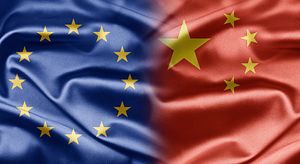Recently, CCTV aired a special program about Chinese President Xi Jinping’s visit to Europe. The program was even given a grandiose title: “A Bridge Between China and Europe.” China’s media continues to play up the success of Xi’s first visit to Europe.
Overall, China’s official media concluded that Xi’s 11-day visit to Europe was “a smiling visit with confidence.” During his visit to France, Xi Jinping quoted Napoleon’s famous remarks that China is a sleeping lion, and “when she wakes, she will shake the world.” But Xi further explained to his French audience that “today, the lion has woken up. But it is peaceful, pleasant and civilized.” Later, in a speech made in Germany, President Xi Jinping stressed that “China will not stir up trouble, but we are also not afraid of trouble.” This is obviously referring to China’s firm position in the ongoing disputes in the East and South China Seas.
Shortly after Xi Jinping concluded his visit to Europe, U.S. President Barack Obama will be visiting U.S. allies in East Asia. While in Europe, President Xi Jinping especially emphasized China’s uniquely important relations with two major countries on the European continent – China’s “cultural intimacy” with France and China’s close economic ties with Germany. President Obama will face a more complex, jumbled regional situation as he visits South Korea and Japan, China’s two East Asian neighbors.
The U.S. faces a series of regional concerns in East Asia. There’s a more powerful and more confident China, whom the U.S. mistrusts. There’s an ambitious and somewhat disobedient traditional ally, Japan. South Korea tries to walk a line between China and the U.S., and North Korea seems to enjoy pulling off upsets every now and then. The U.S. cannot just walk away from Asia, but its return or rebalance to Asia has not been easy.
Although geographically Washington is far from Beijing, the U.S., due to its global leadership and alliance responsibilities in the region, will inevitably have close encounters with a rising China. In facing China, the U.S. will especially seek assistance from its East Asian allies. While there are differences over certain issues between the U.S. and Japan, both stand firmly together with regard to the challenges brought by China’s emergence.
Europeans, however, can make the most of their distance from Beijing and do businesses with the Chinese more comfortably. Compared to the U.S., the EU has a similar total GDP and a larger population size. While smaller than the U.S., the EU also has a relatively large territorial area. Hence, the EU is truly a superpower if viewed as a single political unity. More importantly, the EU does not have the responsibilities and burdens of a world leader, as the U.S. does. Nor is the EU bound up with military alliances in Asia. Despite differences over certain issues such as religion and human rights, there are fewer strategic contradictions between the EU and China compared with the U.S. and China.
What’s more, the EU has a much more flexible policy and attitude toward China regarding economic cooperation and high-tech exports. Hence, China may find more self-respect and confidence in its communication with the EU. In that sense, the EU can be a way for China to balance its relations towards the United States.
A close, friendly, and constructive relationship with the EU is significant for China in a number of respects. First, China “going west” is a reflection of mutual interests with the EU. Second, it demonstrates that China does not want to be completely tied to relations with the U.S. Further, it highlights Beijing’s determination to build a multipolar world order. As Beijing advocates for a “new type of great power relations” with the U.S., it also seeks to enhance its relations with other major powers. The EU is obviously among Beijing’s top priorities.
This leads us to a question: If the U.S. finds itself falling short on its commitments to its allies and key partners, while China continues its rise and keeps “building bridges” across the globe, will the U.S. start to think more seriously about China’s vision for a multipolar world order?

































